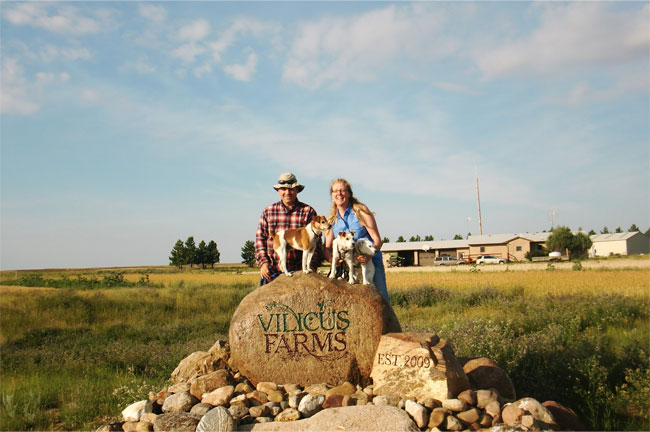
Doug and Anna Jones-Crabtree with their rescued Jack Russell Terriers: Daisy, Rusty and Winston.
To access all the articles in this month's issue of The Organic & Non-GMO Report, SUBSCRIBE NOW.
Vilicus Farms cultivating the next generation of organic farmers
By Ken Roseboro
Published: March 27, 2015
Category: Organic/Sustainable Farming
Apprenticeship program aims to develop new organic farmers and enhance community of organic producers in the Northern Plains
Ask Doug Crabtree what he thinks the key is to increasing organic farming acreage, and he says it’s farmers. “To increase the number of organic acres, we need to create new organic farmers,” says Crabtree, who along with his wife Anna Jones-Crabtree operates Vilicus Farms in Havre, Montana.
Vilicus is Latin for “stewards of the land” and that’s a good description for the Crabtrees on their organic dryland 4700-acre farm. Vilicus Farms grows organic small grains, oilseeds, pulse and broadleaf crops, and a variety of other seed crops. More than 20% of the farm is dedicated to conservation and wildlife habitat.
Aim to create new organic farmers
Doug and Anna are also committed to building a community of like-minded farmers who share their vision, and that’s why they launched an apprenticeship program in 2013 to train new organic farmers. “Our goal is to create new organic farmers and enhance the community of organic producers in the Northern Plains,” says Doug.
While there are a number of horticulture training programs in the US for growing organic fruits and vegetables, there are none for organic grain production. “We feel we have something unique here,” says Doug. “Growing young people into organic farmers is very challenging but it’s vitally important.”
Doug says that training new farmers is easier than trying to convert conventional farmers to organic production. “With the age of farmers in the Northern Plains and years of farming conventionally, the economic reality is that it’s hard to get off the treadmill that is conventional agriculture,” he says.
He says it is easier to train someone who is “of organic mind and who is organically inclined. It’s easier than taking someone who knows how to farm and teaching them organic.”
The apprenticeship has three phases. The first involves immersion or as Doug says “getting your hands dirty.” Apprentices learn the “nuts and bolts” of organic farming, including field and crop scouting, record-keeping, machinery maintenance, weeding, and conservation practices, among others. The second phase is project management, which involves developing a farm business plan. The third phase involves implementing the business plan and managing an independent operation.
Attracting new organic grain farmers can be challenging in the remote open spaces of the Northern Plains. “In our area, the population is at the lowest level in history,” says Doug. “It’s one of the most sparsely populated areas on the planet.”
To date, there has been one apprentice in 2013 and one in 2014. This year there will be two though Anna and Doug are getting more enquiries about the program.
To date, there have been two apprentices: one in 2013 and one in 2014. In 2015 there will be two. Each year, Anna and Doug receive more inquiries about the program.
The Crabtrees are also working with Montana State University to offer college credit for their training program.
Nature’s Path purchased land to help Vilicus Farms expand
Nature’s Path has been a key partner with Vilicus Farms. Last year, the organic cereal manufacturer purchased 2760 acres in Montana as a way to help the Crabtrees expand their farm. “We had purchased our farm in 2009 but we couldn’t buy any more land ourselves,” says Doug. “I became aware of a tract of land on the market and made Nature’s Path aware of it since they were looking for another location.”
Nature’s Path has been purchasing land in Canada and the US to convert to organic production. “It’s important for us to buy organic land; we are securing our supply, and we want to have a positive effect on getting more land transitioned to organic,” says Dag Falck, organic program manager at Nature’s Path.
The Crabtrees farm the land as part of a crop-share arrangement with Nature’s Path, which takes a portion of the value of crops grown on the land.
The partnership between Nature’s Path and Vilicus Farms is natural since they both share similar commitments to organic farming and land stewardship. “It was important to have a landlord that shared our commitment to conservation; we are on the same page in that regard. We both wanted a long-term relationship,” says Doug.
General Mills supporting apprenticeship
General Mills has also been a supporter of Vilicus Farms’ apprenticeship program.
“We want to help create a robust on-farm training program in which someone can gain experience in organic farming and a whole view of what that’s like,” says Beth Robertson-Martin, who handles sourcing of natural and organic ingredients at General Mills.
Robertson-Martin says General Mills is exploring how to help expand the Vilicus Farms’ apprenticeship.
“We will look at how to take the energy of Doug and Anna and the resources of General Mills and expand that,” Robertson-Martin says. “We are a big company and can have a big effect.”
General Mills would like to double the amount of organic acreage in the US in the next five to ten years.
“How do we create initiatives to do that?” Robertson-Martin asks.
Looking at the big picture, Doug says that training new organic farmers can help rebuild farm communities in the Northern Plains that are disappearing. “We not only need to build soil. Organic farming systems can help build rural economies. We are in the community-building business,” he says.
© Copyright The Organic & Non-GMO Report, April 2015
